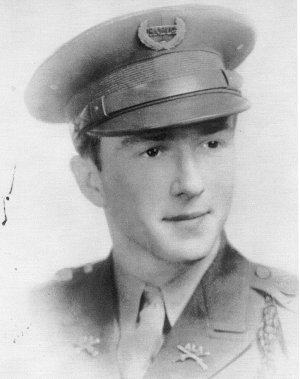World War II Veterans Book: Vernon Warren Cole
An Excerpt
Vernon Warren Cole was born October 26, 1920.
He died December 1, 1944 in service to his country.
Father: Homer Franklin Cole.
Mother: Jewel (Sims) Cole.
Brother: Homer Franklin Cole, Jr.
Vernon enlisted to serve in the US Army May 15, 1942 while attending the University of Alabama. He was enrolled in R.O.T.C. (Reserve Officer Training Corps), and after graduating from the university in December 1943, he attended (OCS) Officer Candidate School at Fort Benning, Georgia. He completed his course of study there and was commissioned Second Lieutenant Vernon Warren Cole with a new serial number, O-549 414.
The intensity of the war had heightened in both the European and Pacific Theaters. The Allies had unloaded more than two million men and seventeen million tons of supplies––more than twice the total tonnage that went to General Pershing for the entire duration of World War I. As soon as troops had met training requirements, they were shipped out to one of the war zones. Vernon was sent to the European Theater attached to Company C, 51st Armored Infantry Battalion, 4th Armored Division.
The division departed Boston December 29, 1943, and arrived in England January 11, 1944. As soon as Vernon graduated from OCS in the spring, he joined the division in England as a platoon leader, a very dangerous position that sustained a high casualty rate. Cole and his fellow citizen-soldiers of the 51st Armored Battalion landed across Utah Beach in France July 13, 1944 and entered combat July 17. They took Coutances by July 28, and two days later had taken Avranches and captured the See River Bridge.
Cole was engaged in heavy fighting as the 4th Armored drove south to cut off the Brittany Peninsula in early August. By the middle of the month he and the men of the division had taken Orleans and moved on to reach the Meuse River at Commercy and Pontsur-Meuse to establish bridgeheads by August 31. The division crossed the Moselle River near Lorey September 2, against heavy opposition from the enemy. In mid-September, against strong German counterattacks, the division overpowered the Marne-Rhine Canal and moved into Luneville. Amid a series of tank duels the fighting G.I.s mopped up the Arracourt region, but a German attack overran their lines and Vic-sur-Seille and Moncourt were lost. The Germans continued their strong attacks, and the division suffered heavy losses in the Battle for Hill 318 before defeating the Nazi forces as they attempted to hold on to Arracourt. Battle-weary, they continued to fight until relieved for rehabilitation by the 26th Infantry Division on October 12.
The fighting continued and by mid-November the 4th Armored had suffered heavy tank losses to a German counterattack. On November 24 it crossed into the Saare at Romelfing and cleared Baerendorf in house-to-house fighting. The division then cleared its zone of responsibility and next opened the attack on Saare-Union in the Alsace region December 1, 1944. On that day, young Second Lieutenant Vernon Cole gave his life in combat. It had been exactly a year since he had received his college degree. His body was returned to Fort Payne in 1949 for burial in Glenwood Cemetery.
Judge Randall Cole remembers that day: “As a six-year old child, I remember well the day that the body of my cousin, Vernon Cole, was returned to Fort Payne after he was killed in combat in France four years earlier. It was pouring rain as a large group of family and friends gathered at the railroad depot to await the arrival of the train. Everyone remained in their cars until the train approached, and then a sea of black umbrellas emerged from the cars. We all stood silently, except for the weeping, under the protection of the umbrellas, as the big door on the side of the train car was pushed back revealing a flag-draped casket. An employee at the depot pulled one of the big four-wheeled luggage wagons forward and some men moved the casket from the train to the waiting hearse.
At the burial in Glenwood Cemetery a few days later, I was struck by the presence of the military color guard and the way they removed the flag from the casket, folded it, and presented it to my aunt. Although I was too young to remember Vernon in life, his death impacted my life and his valiant service enriched my heritage.”
Medals awarded: Combat Infantryman’s Badge, Purple Heart Medal, American Campaign Medal, European-African-Middle Eastern Campaign Medal with three Bronze Battle Stars (for Normandy, Northern France, Rhineland), World War II Victory Medal.
Cole left his hometown of Fort Payne to serve his country. He is at rest in Glenwood Cemetery.

